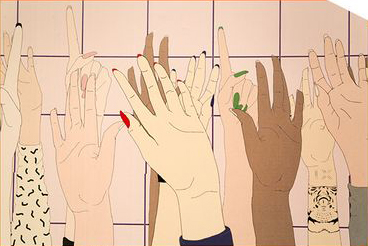Where does university curriculum start and end? Who is seen to own or guard it? Who shapes its content and says what knowledge is relevant, valid, worthy?

Such epistemological questions are of great concern in an increasingly diverse and internationalised sector producing persistently inequitable experiences and outcomes for students of colour. And such questions are addressed in a rich variety of ways in the Arts Student Union and UAL’s Decolonising the Arts Curriculum Zine 1 (2018) and 2 (2019), which makes us consider:
- What might have been put forward by academics as universal truth or fact may be challenged as western perspective, discounting and undermining the knowledge of the eastern, subaltern, colonised, indigenous;
- What might have been seen as British or European history may now be understood as colonial history and questioned for its lasting impact on today’s global, ethnic inequalities.
Reading Lists
Western higher education continues to play a dominant role in the validation of knowledge worldwide, through its research and its taught and assessed curricula. In creative arts higher education the reading list is one small part of how such curricula is defined and communicated but it is still a familiar way of directing students’ reading into and around their chosen discipline. And although reading lists are not strictly followed on many creative degree courses, and do not necessarily equate to ‘learning’, they do still offer ideas and language that shape how disciplinary discourse is created, forming perceptions of the types of knowledge that are valued or given most prominence.
Audits of reading lists included in course handbooks and unit guides in recent years have revealed how much of our disciplinary knowledge is still grounded in white, male, western-centric perspectives. At LCC such audits have been carried out by independent organisations like Shades of Noir (2017), and by LCC students and staff as part of the Still Waiting Discussion Group (2016), Liberate the Curriculum project (2018-2020) and more recently by LCC Changemakers.
Liberate the Curriculum
The latter project supported students to work with academics and librarians from ten courses at LCC between 2018-2020. They collaborated to review and reimagine selected reading lists through the lenses of ‘liberation’ and ‘decolonisation’. The staff-student collaboration aspect of the project was itself a step towards liberating and decolonising as it allowed for conventional academic and epistemological hierarchies to be challenged, inviting students and librarians to play active roles in critiquing and developing disciplinary knowledge rather than being passive recipients or consumers of such knowledge, and for academics to develop their roles as facilitators of knowledge development rather than being guardians of the canon.
As such, the Liberate the Curriculum project was more concerned with process, dialogue and relationship building than product, and this dialogue was supported by regular meetings through the project cycles. The project led to immediate changes to reading lists, but more importantly, it influenced developments in discourse between academics, students and librarians, and shifts in how course curriculum is conceived of, with some courses introducing new resources across all units which address the bigger questions of how the discipline has been shaped and by whom, such as Decolonising Design.
The project set out to make changes to reading lists and simultaneously develop approaches for curriculum liberation beyond the reading list. Whilst there is no straightforward, one-size-fits-all approach to liberating or decolonising curricula, methodological understanding was gained through the project and previous auditing exercises, and these informed the development of a Decolonising Reading Lists Tool (UAL, 2019). This resource offers guidance to course teams on working with each other, librarians and students to do this work, in ways that students can benefit without feeling burdened, and is a key resource for LCC Changemakers.
The LCC Liberate the Curriculum was case studied by Jess Crilly, Lucy Panesar and Zey Suka-Bill for an article in the international Journal of University Teaching and Learning Practice (2020), and LCC academic Jennifer Good reflects on her experience of Liberate the Curriculum in an article for Viewfinder Magazine on ‘Confronting Colonialism in Photography Education’ (2020).
Changemakers
Since April 2020, LCC has employed current student and recent graduate Changemakers to codevelop anti-racist and decolonial curricula and teaching practices with course teams. This work takes opportunities for embedding anti-racist and decolonial pedagogy through Course Quality processes and the Academic Enhancement Model. Changemakers also play a key role facilitating the Decolonising Wikipedia Network in relation to LCC subject disciplines.
Visit these pages linked above for more information, or contact project manager Lucy Panesar on l.panesar@lcc.arts.ac.uk
